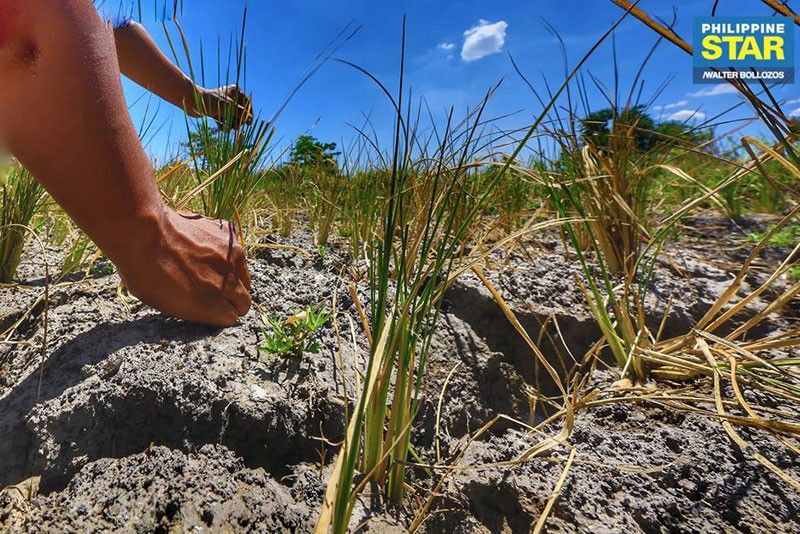Philippines underscores reality of climate change

MANILA, Philippines — Foreign Affairs Secretary Teodoro Locsin Jr. has called for global action to address climate change.
Speaking at the United Nations high-level meeting on climate change and sustainability in New York on Friday, Locsin noted that the impact of climate change is as bad as anticipated and faster than estimated.
“If climate action does not measure up to what is needed, we all face the same fate of diminished existence or extinction altogether,” he said.
He noted that while the Philippines has put in place effective programs for more accurate and integrated disaster anticipation, prevention and adaptation in order to cope with climate change, what is needed is action by the major carbon-emitting countries.
“If the most capable and able will not do more to slow and halt climate change, most will eventually stop talking about it and let climate change run its full and fatal course: the desertification or inundation of our planet; the starvation and extinction of populations; and the end of everything worthwhile attained by human ingenuity,” he added.
The meeting was convened by the president of the 73rd session of the UN General Assembly, Maria Fernanda Espinosa Garcés, to highlight inter-linkages between climate and the Sustainable Development Goals and to promote an intergenerational approach to climate action.
Earlier this month, the Philippines joined three other Asian countries in calling for increased support for climate adaptation projects in developing countries.
Representatives from Bhutan, Mongolia and Vietnam signed a joint declaration with the Philippines during a learning exchange program in Quezon City. In the declaration, the four countries called for the highest political commitment to combat climate change and its adverse impacts, and to pursue green growth as a matter of urgent priority for Asia-Pacific countries.
“(We) declare our strong solidarity with countries such as ours that are most vulnerable to the impacts of climate change, and underscore the need to support efforts aimed to enhance adaptive capacity and build resilience,” read the declaration.
The four countries also called for increased project support and the realization of the $100-billion annual funding target for the Green Climate Fund (GCF), which was established to provide a financial mechanism for climate adaptation projects in vulnerable countries.
The declaration said the successful replenishment of the GCF would be an expression of global solidarity and partnership, stressing the need for it to be urgently allocated to adaptation and mitigation priorities of climate-vulnerable communities.
The group also committed to ensure that all stakeholders respect the principle of country ownership during the country program development process for the GCF, as well as recognize the role of the private sector, civil society, academe and other stakeholders to help governments succeed in accessing climate finance to combat climate change.
Risk assessment
In an interview with The Chiefs aired on Cignal TV’s One News on Friday. Climate Change Commission commissioner Nico Antonio Gaerlan underscored the need to prepare for the impact of climate change.
“Our contribution to the greenhouse gas emissions is just about 0.3 percent of total global emissions. We have no control of all these countries… If they fail, we suffer the brunt of the consequence,” he said in a mix of English and Filipino. “This is more reason why we need to adapt and anticipate, prepare for the worst-case scenario.”
Gaerlan said the country should immediately conduct a comprehensive risk assessment to determine possible impact of climate change in different areas.
“What we have are vulnerability assessment, exposure data,” he said, “If we’re talking about climate change, we’re talking about what can happen to you in the future…That’s what we’re trying to prepare for, the unseen probabilities that can happen to you.”
He highlighted the need to come out with risk assessment or develop “risk profile maps” especially in climate change vulnerable areas in the country, citing the need for people to be made aware of hydrometeorological hazards such as heavy rains, flooding and rain-induced landslides.
“It is stated in the Philippine Development Plan that we need to do this risk assessment as soon as possible but then at the same time, we need to get a response from concerned agencies to be able to execute this,” Gaerlan added.
Proper management
In the same episode, climate change expert Carlos Primo David expressed his belief that the impact of the water shortage problem being experienced in some parts of Metro Manila could have been lessened if there was proper management of water by authorities.
“It always boils down to management. Even if the resource (has a problem) but is managed properly, then you can dampen the impact of a crisis. For example, in this particular issue, if we know that there is a problem in water supply, the concerned concessionaire could have started implementing rotational water interruptions since last year, which could be around one to two hours just to manage the blow. That is better than having a 24-hour water supply continuously, then all of a sudden, you will just get to have six hours of water supply a day,” he pointed out.
He advised water companies to plan ahead for natural calamities like El Niño, a natural phenomenon experienced every two to seven years.
“Scientists have not yet decided what is the impact of climate change to the El Niño cycle but it looks like it will be intensified instead of having just a weak El Niño. With climate change, we will have the stronger types of El Niño,” he said.
As a conservation measure, he proposed a socialized scheme in water distribution—one that would depend on the ability of a family or a household to pay.
“If I belong to a poor family, this is my allocation – P300 just like anybody else, but if I consume more than that, there should be a penalty,” he said, stressing that the scheme could make consumers aware that water is a finite resource.
David pointed out that while “water is a basic right…no person has the right to waste water beyond what is accorded.”
“It says in the Constitution that each and every person has the right to access clean and potable water. Everyone has the right to this particular amount of water, and you have no right to waste water beyond what is accorded to you. After a certain volume of water is provided to you at a low price, and beyond that, you wasted water, you have to pay for it,” he explained.
Meanwhile, the Department of Agriculture has warned that aside from Metro Manila, Northern Luzon where a significant portion of the local farm sector is located may also be affected by the dry spell.
“Northern Luzon, including Central Luzon and Metro Manila, could face a serious water supply crisis unless something is done about the massive deforestation which results in the drying up of creeks and rivers,” Agriculture Secretary Emmanuel Piñol said.
Piñol recently flew over Cagayan and nearby areas where he saw heavily silted and drying up rivers, waterless creeks and denuded mountains.
“I also saw the very low water level at both La Mesa Dam, which provides water to Metro Manila, and the Magat Dam which is the source of irrigation water for Cagayan Valley,” he said.
Piñol recommended long-term solutions to avert a much worse water supply issue in the future, including a national program to locate and identify headwaters to be declared as protected areas and the reforestation of denuded mountains.
“There should also be legislation to require all local government units, with the support of national government agencies, to establish water catchments, small water impounding and mini-dams,” he said.
He also called on the government to invest in the construction of more dams not only for irrigation purposes but also for water supply reservoirs for urban areas.
“This task will not be easy and the results will not be quick. Trees will not grow and cover the mountains in just two to three years. But this is not about today but the future and the next generation of Filipinos,” he added. – With Rhodina Villanueva, Louise Maureen Simeon
- Latest
- Trending





























